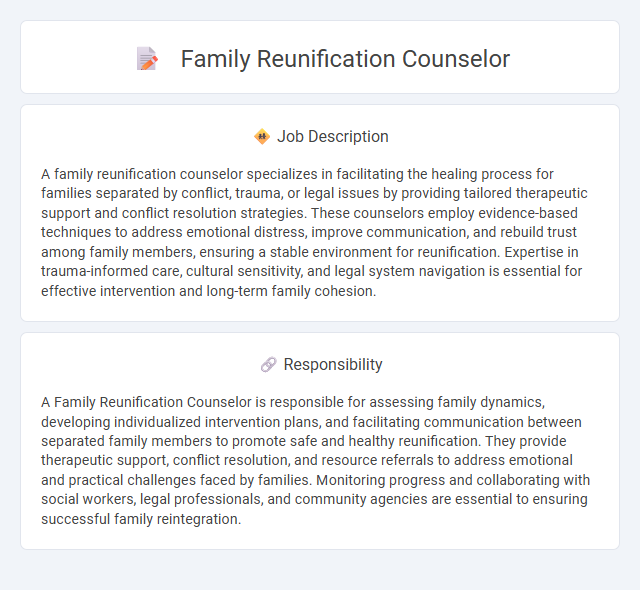
A family reunification counselor specializes in facilitating the healing process for families separated by conflict, trauma, or legal issues by providing tailored therapeutic support and conflict resolution strategies. These counselors employ evidence-based techniques to address emotional distress, improve communication, and rebuild trust among family members, ensuring a stable environment for reunification. Expertise in trauma-informed care, cultural sensitivity, and legal system navigation is essential for effective intervention and long-term family cohesion.
Family reunification counselors likely work best with individuals who demonstrate strong empathy, communication skills, and patience, as the role often involves sensitive and emotionally charged situations. Candidates with experience in social work, psychology, or counseling are probably more suitable due to the need to understand complex family dynamics and multicultural environments. Those lacking emotional resilience or conflict resolution abilities might find the job challenging and less fitting to their strengths.
Qualification
A Family Reunification Counselor must possess a Bachelor's degree in social work, psychology, or a related field, with many employers preferring a Master's degree. Key qualifications include extensive experience in family therapy, crisis intervention, and case management, along with strong communication and conflict resolution skills. Certification or licensure as a professional counselor or social worker is often required to ensure adherence to ethical standards and effective client support.
Responsibility
A Family Reunification Counselor is responsible for assessing family dynamics, developing individualized intervention plans, and facilitating communication between separated family members to promote safe and healthy reunification. They provide therapeutic support, conflict resolution, and resource referrals to address emotional and practical challenges faced by families. Monitoring progress and collaborating with social workers, legal professionals, and community agencies are essential to ensuring successful family reintegration.
Benefit
A Family Reunification Counselor likely provides crucial support that enhances family dynamics and promotes emotional healing, increasing the chances of successful reunions. This role probably offers job satisfaction through meaningful impact on clients' lives while developing specialized skills in conflict resolution and counseling. Employment in this field may come with benefits such as steady demand and opportunities for professional growth in social services.
Challenge
Family reunification counselors likely face challenges related to managing complex emotional dynamics between separated family members while facilitating communication and trust-building. They may encounter cultural and legal barriers that complicate the reconciliation process, requiring sensitivity and adaptability. Navigating cases involving trauma or conflict might demand advanced conflict resolution skills and resilience to support families toward successful reunification.
Career Advancement
A Family Reunification Counselor advances their career by gaining specialized certifications in trauma-informed care and conflict resolution, enhancing their ability to support diverse family dynamics. Pursuing advanced degrees in social work or psychology opens opportunities for leadership roles, such as program director or clinical supervisor. Building expertise in community resources and legal frameworks allows counselors to influence policy development and advocate effectively for family welfare.
 kuljobs.com
kuljobs.com